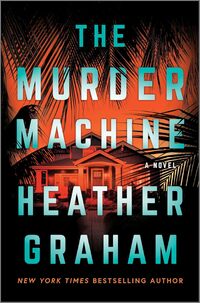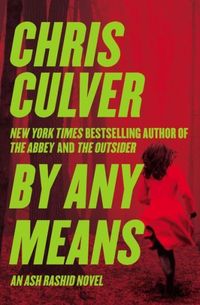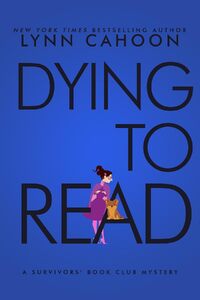 THE MURDER MACHINE |
 The books of May are here—fresh, fierce, and full of feels. |

Purchase
Ash Rashid #3 Mystery Excerpt of By Any Means by Chris CulverEven eight months after the Indianapolis Metropolitan Police Department transferred him to the community relations “team,” Detective Sergeant Ash Rashid still re- sented his blue polyester uniform, but even more than the uniform, he resented the lack of a weapon. Going without it felt like driving to work without pants; it was fun at first, but it grew old quickly. He understood the reasoning be- hind the prohibition—few school assemblies or neighbor- hood watch meetings ended in gunfire—but he still would have liked to carry one if for no other reason than to com- pare his firearm to the ones carried by the students in some of the rougher school districts he visited. But as he drove home from a particularly long Q&A session at a meeting on the city’s east side, it wasn’t a disgruntled community mem- ber or an angry student who ruined his day; instead, it was a careless driver who had forcefully introduced the front end of his Mercedes to a telephone pole. Ash pulled his gray cruiser to a stop approximately fifty feet from the vehicle, groaning as he flicked on the light bar hidden in his car’s grill and rear window. With the sun still high and soft in the late afternoon sky, few people would be able to see his lights, but regulations required them for officer safety. They required all sorts of things for officer safety that made little sense. He pulled out a pad of paper from his utility belt and began jotting down the conditions of the scene upon his arrival. The city hadn’t received any appre- ciable rainfall in at least a week, which meant the driver hadn’t slipped on water. He must not have been going very fast, either, because the vehicle’s airbags hadn’t deployed on impact. If nothing else, that would save him a couple grand in repair bills at the expense of some bruising. It was a mi- nor fender bender; unless he was too drunk to stand, he’d walk away from it without issue. Ash slouched and closed his eyes. Having handled at least half a dozen homicides in the surrounding blocks, he knew the area fairly well even if he hadn’t been there for a while. A beat cop had found a corpse stashed amid the weeds on a lot to his left just a couple of weeks ago, and the city’s nar- cotics unit frequently conducted buy-busts in the area. He didn’t want to stay there any longer than he had to, so he punched the talk button on his radio, already dreading the response he would likely receive. “Control, this is Charlie-thirteen. Please respond.” Charlie designated his unit—community relations—while thirteen indicated his rank, sergeant. The dispatcher wouldn’t be able to individuate him by his radio call sign, but she’d have a pretty good idea if she looked him up. “Charlie-thirteen, this is Dispatch-seventeen. Go ahead.” “Yeah, Seventeen. I’ve got a single-car collision on Forty- Second near the fairgrounds. It doesn’t look serious, so I’d be very grateful if you could send someone by to redirect traffic. I’m on my way home.” “Negative, Charlie-thirteen. All of our officers are tied up right now in an emergency call. Please remain on site until you receive further word.” Ash closed his eyes and pinched the bridge of his nose, hoping to stave off a headache. “Seventeen, please reevaluate deployment.” “Sorry, Charlie. The swing shift is short tonight. I’ll get someone out there as soon as I can.” Ash shook his head and readjusted himself on the seat, feeling his back stick to the warm vinyl. “You want to tell that to my wife, Seventeen?” “Negative, Charlie-thirteen. You’re on your own.” “That’s what I thought.” Ash hung up the microphone and turned the radio to low before fishing his cell phone from his pocket. He called his wife far more often than he did anyone else, so her number occupied the first slot in his address book. It only took a cou- ple of button presses to get her on the phone. “Hey, honey. Guess whose favorite person is going to be late tonight?” Hannah paused. “I wouldn’t know. My two favorite peo- ple are in the living room with me.” She meant their two kids. Ash glanced at a colored-pencil drawing of a police officer on his dashboard that his daugh- ter, Megan, had given to him that morning before he left for work. Now that he wore a uniform every day instead of a detective’s suit, she told everybody—stranger or friend— about her police officer father. “I suppose your third-favorite person is going to be late. Sorry.” “How late? Your sister and Nassir are coming over for if- tar in a few hours.” Ash’s stomach rumbled, reminding him that he hadn’t eaten since before sunrise that morning. Iftar is the evening meal that breaks a Muslim’s fast during Ramadan, and he had been looking forward to it all day. He glanced out his window and noticed a line of cars that had begun to queue on the street, their drivers likely thinking he would open the road and wave them through eventually. Pedestrians, meanwhile, had begun to gather on the porches and stoops of houses nearby. “I’m not sure. I’ll head out as soon as another supervisory officer gets here. Shouldn’t be too long.” “Are you close? We’re out of dates, so I wanted to go to the grocery store. I’d rather not lug the kids around if I can help it. You know how Megan gets.” Ash knew what she meant; the last time he had taken his daughter to the grocery store, she made beeping noises when an overweight woman backed her cart up in a crowded aisle. Megan laughed, but the overweight woman didn’t find it quite that funny. Ash looked around him again, confirming his location with street signs. “I’m about a block north of the fairgrounds. Once I get moving, it should only take me ten or fifteen minutes to get home.” “Are you sure you’re not in a bar?” Excerpt from By Any Means by Chris Culver |
|
| |||
|
||||




 © 2003-2025
© 2003-2025